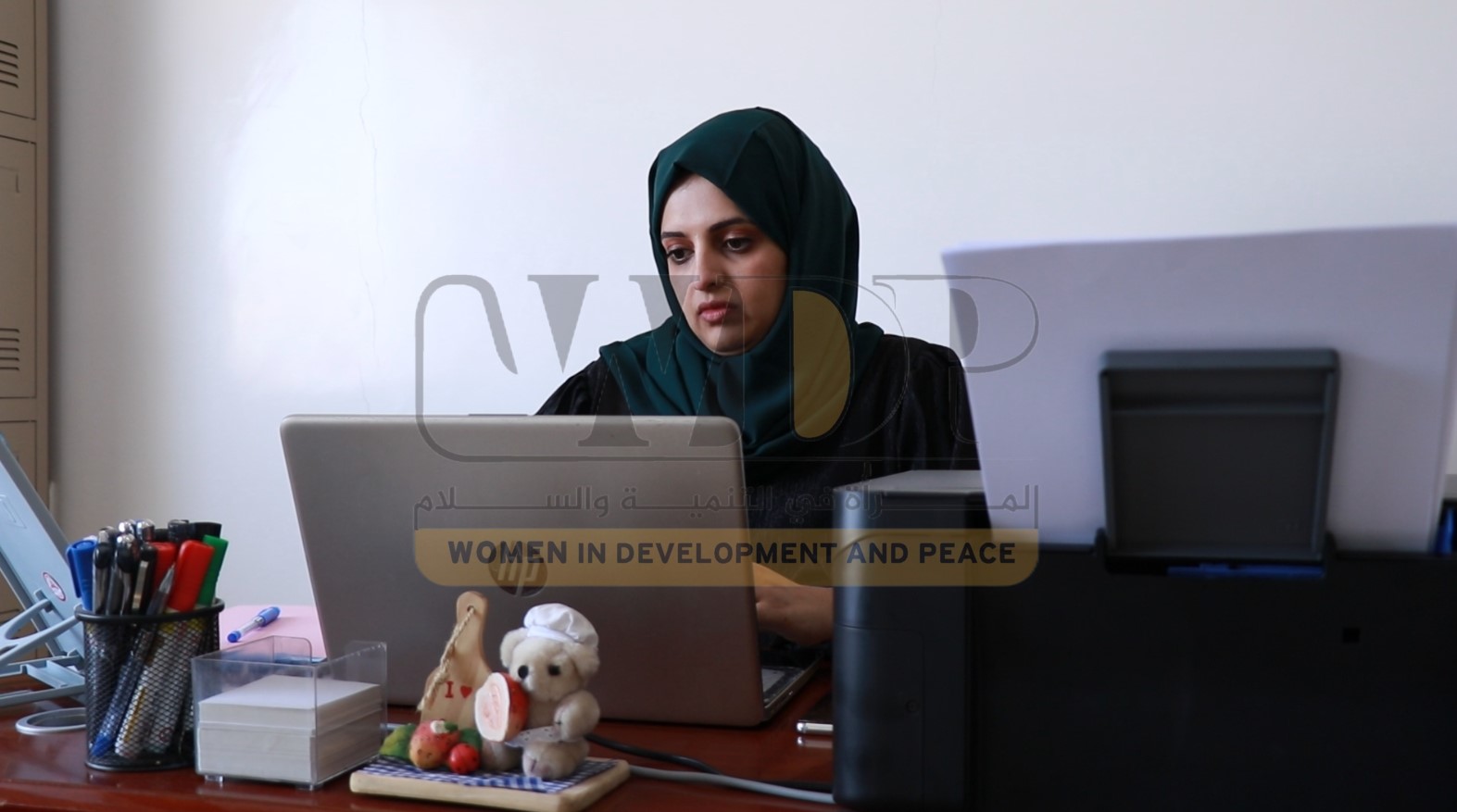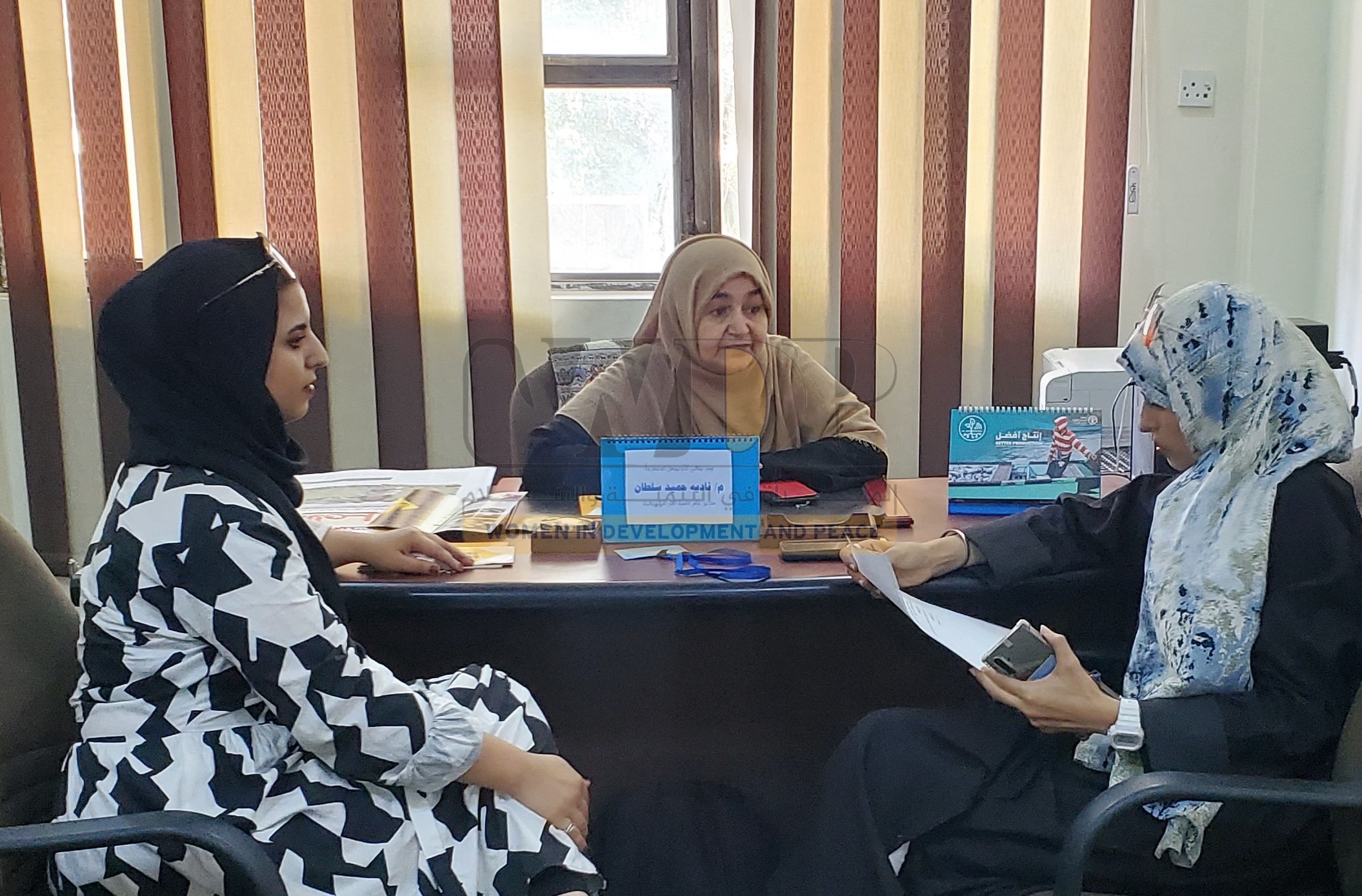Haneen Al-Wahsh – Women in Development and Peace
The percentage of women enrolling in universities in Yemen is steadily rising, despite the challenges that undermine these opportunities. This is with the exception of public awareness, which has become more accepting of the importance of education for women.
One of these challenges is the story told by Aala Al-Hariri, whose story took place a year before graduation. She says: “I was smart in my studies and spent all my time studying my lessons from day one. I even met friends who graduated years before me from university. Despite their excellence, they ended up staying at home. Their university degrees were left for bookworms.”
Aala continues: “I became discouraged and felt that there was no point in my studies. I preferred to live my life as a wife and mother.” Here, the young activist, Muna Masood, criticizes the paradox with which Aala ended her educational journey. She points to the large number of women working in public and private facilities who have reaped the benefits of their learning and training by seeking suitable work like other young men and women.
The young activist, Muna, is leading a media campaign calling for the empowerment of female university graduates in the public sector. She emphasizes that this is the best way to prevent girls from dropping out of education and encourage families to push their daughters toward higher education.
A Legal Challenge
Muna Masood says: “The legal texts in Yemeni law are almost discouraging to many graduates, male and female. These include the requirements for obtaining a public job such as years of experience and meeting the years of contract, although the law considers the age of 18 suitable for employment.”
Muna describes the legal provisions contained in Law No. 43 of 2005 and the decision of the Prime Minister’s Council regarding the system of appointment in the public service as unjust. These legal provisions specify an age of 37 and a minimum of 13 years of experience to obtain the position of General Manager, which she considers a challenge facing graduates and new public sector employees, both male and female.
Lawyer and human rights activist Muhammad Al-Ariqi calls for a review of the legal provisions related to work in the Yemeni constitution, saying: “We are living in an age of information and technological development that old leaders lack. Conditions are conducive for young graduates, especially women, whose success rates in secondary and university exams exceed those of men.”
Wasted Potential
Social researcher, Samir Al-Maqtari, says, “Yemen has a large human resource pool, with a majority of its people characterized by enthusiasm, activity, love of knowledge, professionalism, and expertise. However, these are wasted potentials.”
Estimates from 2018 show that youth in Yemen represent 54% of the population, while children make up about 39%. UN estimates from 2020 also indicate that 50% of young people are female.
Al-Maqtari points to the power, enthusiasm, thirst for knowledge, and eagerness to gain experience that young graduates possess, particularly women. But these abilities, he describes, are quickly crushed against the walls of reality and the bureaucracy of the general system.
He confirmed that a study he conducted in a coastal community in Yemen found that 95% of female university graduates remained at home without job opportunities, either in the public or private sectors. Meanwhile, 50% of young men joined the battlefronts imposed by the reality of the conflict.
The study also found that 90% of female respondents expressed ambition and a desire to pursue job opportunities. 5% of them stated that their husbands would not allow them to work outside the home, preventing them from joining the job market even if opportunities arose.
The Impact of the Conflict
The armed conflict has taken the lives of many Yemenis and caused an enormous increase in unemployment in a country where most of its people live under the threat of poverty and on the verge of starvation.
The armed conflict has paralyzed various public sectors, most notably education and healthcare, limiting the access of children and youth to education, especially females, who are considered among the most affected by the conflict. The healthcare sector has also witnessed a massive collapse in various facilities and units in many Yemeni governorates.
University graduates are among the groups affected by the conflict due to the high unemployment rate and the disruption of public sector hiring. This means that there’s a backlog of paperwork and certificates for graduates over the past 10 years of conflict in the records and corridors of the civil service.
Fadia Sarhan makes sure to renew her registration with the civil service annually, although she has no hope of getting a public job, as she puts it. She said, “Employment in Yemen is stalled because of the conflict. If there’s a chance, it’s through connections, as was the reality in the past.”
She confirms that since she graduated (in the first year of the conflict), she has worked as a teacher in a private school for a meager salary, despite having a degree in Business Administration and extensive knowledge of government administration. In her view, this department should be one of the most sought-after in the public sector, which cannot function without relying on these skills.
An Endless Contract
Hiba Jameel graduated from university five years ago. Driven by determination and a love for knowledge, she enrolled in graduate school (Master’s Degree). She says she hopes her advanced degree will offer her a chance to secure a permanent position, as she has been working as a contractor in the public sector for four years, in the secretarial department.
Hiba managed to join the government sector a year after graduation. However, three years of work were enough for a different feeling to set in. She said, “I felt like I was standing still and not making any progress, just a contract girl with a salary that wasn’t enough to cover my travel costs from home to work.”
She continues, “There are no training or development courses. And those around you have limited experience that’s not much different from ours, even though they’ve spent years in the same job,” which made her fear that the same fate would befall her.
Driven by these thoughts, Hiba stopped working in the public sector and enrolled in her Master’s degree. She said, “I was afraid that the contractual commitments would eventually strangle me.” This is how Hiba described her years working in the public sector.
Today, Hiba calls on government entities to invest in the capabilities of female graduates and their enthusiasm when joining the workforce. She warns against freezing this enthusiasm and extra energy in the mold of the boring daily routine. She said, “The public sector needs to improve its work mechanisms. For example, digitizing the government apparatus instead of the routine paper and records. This endeavor won’t succeed unless we invest truly in the capabilities of graduates, especially female graduates.”
There are some positive prospects for the situation of Yemeni female graduates in employment. These include increasing awareness of the importance of empowering women in society, including their participation in the labor market and assisting them in acquiring the necessary skills for available jobs. Graduates must also seek to acquire new skills that suit the job market’s needs, such as English language skills, computer skills, and entrepreneurship. They should also join training programs or specialized courses to learn new skills.


